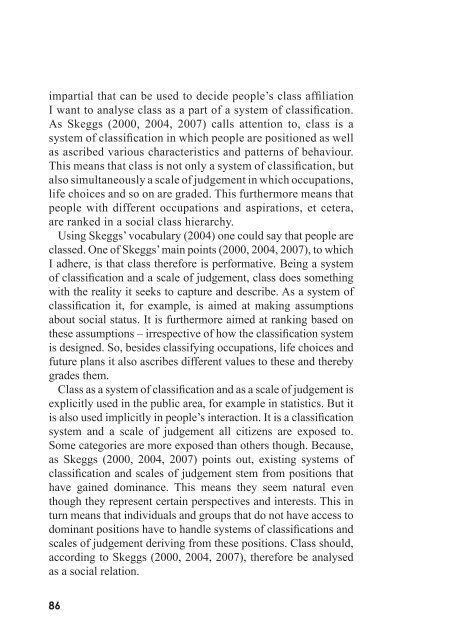Thinking with Bevereley Skeggs - Stockholms universitet
Thinking with Bevereley Skeggs - Stockholms universitet
Thinking with Bevereley Skeggs - Stockholms universitet
- No tags were found...
You also want an ePaper? Increase the reach of your titles
YUMPU automatically turns print PDFs into web optimized ePapers that Google loves.
impartial that can be used to decide people’s class affiliationI want to analyse class as a part of a system of classification.As <strong>Skeggs</strong> (2000, 2004, 2007) calls attention to, class is asystem of classification in which people are positioned as wellas ascribed various characteristics and patterns of behaviour.This means that class is not only a system of classification, butalso simultaneously a scale of judgement in which occupations,life choices and so on are graded. This furthermore means thatpeople <strong>with</strong> different occupations and aspirations, et cetera,are ranked in a social class hierarchy.Using <strong>Skeggs</strong>’ vocabulary (2004) one could say that people areclassed. One of <strong>Skeggs</strong>’ main points (2000, 2004, 2007), to whichI adhere, is that class therefore is performative. Being a systemof classification and a scale of judgement, class does something<strong>with</strong> the reality it seeks to capture and describe. As a system ofclassification it, for example, is aimed at making assumptionsabout social status. It is furthermore aimed at ranking based onthese assumptions – irrespective of how the classification systemis designed. So, besides classifying occupations, life choices andfuture plans it also ascribes different values to these and therebygrades them.Class as a system of classification and as a scale of judgement isexplicitly used in the public area, for example in statistics. But itis also used implicitly in people’s interaction. It is a classificationsystem and a scale of judgement all citizens are exposed to.Some categories are more exposed than others though. Because,as <strong>Skeggs</strong> (2000, 2004, 2007) points out, existing systems ofclassification and scales of judgement stem from positions thathave gained dominance. This means they seem natural eventhough they represent certain perspectives and interests. This inturn means that individuals and groups that do not have access todominant positions have to handle systems of classifications andscales of judgement deriving from these positions. Class should,according to <strong>Skeggs</strong> (2000, 2004, 2007), therefore be analysedas a social relation.86
















